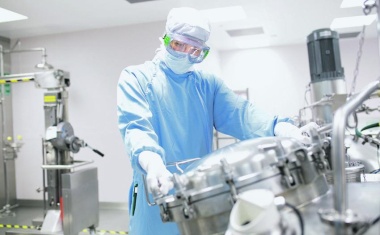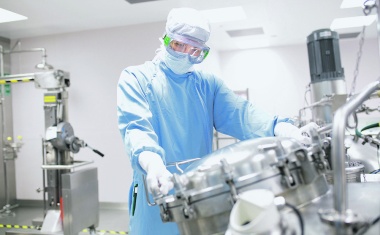
Lilly to Expand US Drug Manufacturing with $27 Billion Investment
Eli Lilly plans to invest $27 billion to bolster its domestic medicine production across several therapeutic areas by building four new manufacturing sites in the US.

Eli Lilly plans to invest $27 billion to bolster its domestic medicine production across several therapeutic areas by building four new manufacturing sites in the US.

US drug manufacturer Eli Lilly announced a $3 billion expansion of its US manufacturing facility in Kenosha County, Wisconsin, that the company acquired earlier this year. This investment will extend the company's global parenteral (injectable) product manufacturing network for diabetes, obesity and future medicines across therapeutic areas.

Eli Lilly and Company (Lilly) recently announced a $4.5 billion (€4.07 billion) investment to create the Lilly Medicine Foundry, a new center for advanced manufacturing and drug development.

Eli Lilly has completed its acquisition of Morphic, is a biopharmaceutical company developing oral integrin therapies for treatment of serious chronic diseases. The $3.2 billion deal was initially agreed upon by the companies in July 2024.

Eli Lilly plans to invest another $5.3 billion in its US manufacturing site Lebanon, Indiana, increasing the company's total investment in this site $9 billion. The investment will expand Lilly's capacity to manufacture active pharmaceutical ingredients (API) for tirzepatide injections marketed under the Zepbound and Mounjaro brands.

Interview with Edgardo Hernandez, President Manufacturing, Lilly

Isomorphic Labs announced strategic collaborations with leading pharmaceutical companies, Eli Lilly and Company and Novartis. These partnerships have the potential to be worth nearly €2.75 billion ($3 billion) to Isomorphic Labs, excluding any royalties that may result from future drug sales. Both collaborations are multi-target, focused on small molecules, and include a combination of upfront and milestone payments.

US drug manufacturer Eli Lilly has completed its acquisition of radiopharmaceutical company Point Biopharma for approximately $1.4 billion.

Eli Lilly announced that it is acquiring radiopharmaceutical company Point Biopharma for $12.50 per share in cash, valuing the deal at approximately $1.4 billion. Point has pipeline of clinical and preclinical-stage radioligand therapies in development for the treatment of cancer. The transaction has been approved by the boards of directors of both Indianapolis-based US companies.

Major drugmaker Eli Lilly has agreed to acquire Versanis Bio, a privately held obesity drug maker, for up to $1.925 billion. The transaction is subject to customary closing conditions.

Major drugmaker Eli Lilly is to pay up to $2.4 billion to acquire Dice Therapeutics, a US biotech specializing in developing oral medicines to treat chronic autoimmune and inflammatory diseases.

Biopharma companies are facing funding challenges in 2023 as interest rates rise and investors are becoming more risk adverse. There is hope on the horizon, say some analysts, while others project a prolonged slump due to inflation and global instability. Established pharmaceutical companies are often seen as safer investments, with larger developers expected to perform well in 2023, especially if litigation threats against drugs like Zantac disappear. However, concerns about revenue gaps continue for big companies like GSK and Sanofi, and their strategy and leadership will be closely monitored in the coming months.

Plans by major insulin producers Eli Lilly, NovoNordisk and Sanofi to drop their prices may be undercutting the US state of California’s state-backed generic insulin scheme.

The world's largest insulin producers, Eli Lilly, NovoNordisk and Sanofi are now marching (almost) in lockstep to reduce US market prices, but not without tossing sideward barbs at the system.

Danish drugmaker Novo Nordisk has added its name to the list of insulin producers cutting prices for US retail buyers, following up on Eli Lilly’s announcement of price cuts and in response to growing pressure from the White House.

Bayer is looking to spend $1 billion on drug research and development in the United States during 2023 as part of a plan to double its sales in the country by the end of the decade.

As the discussion surrounding the high price of insulin in the US continues unabated, drugmaker Eli Lilly implemented price reductions of 70% for its most commonly prescribed insulin products at the beginning of March.

Lilly has agreed to acquire Akouos, a precision genetic medicine company that is developing gene therapy treatments for hearing loss. Both companies’ boards have approved the deal, which is expected to close in the fourth quarter and cost Lilly up to $610 million.

From next year, GSK’s top management will be led by a double female team, a pioneering move for the global pharmaceutical industry. The UK drugs giant this week announced the appointment of Julie Brown, the first woman to be its chief financial officer.

Bachem, a Swiss specialist developer and manufacturer of peptides and oligonucleotides, has announced the signing of two major contracts for supplying large volumes of peptides over the next two years. The orders are worth 25 million and 150 million Swiss francs for 2023 and 2024, respectively.

A US federal court has ordered Eli Lilly to pay over $61 million in damages after whistleblower Ronald Streck filed a lawsuit alleging that the drugmaker had underpaid rebates required under the Medicaid program.

US drugmaker Eli Lilly has announced plans to invest $2.1 billion to expand its manufacturing footprint by setting up two new sites in Boone County, Indiana. The facilities will expand Lilly’s network for active ingredients and new therapeutic modalities, such as genetic medicines, while also supporting increasing demand for its products.

Bachem, a Swiss specialist in the development manufacture and manufacture of peptides and oligonucleotides, has entered into a strategic collaboration with major drugmaker Eli Lilly.

US drugmaker Eli Lilly is investing about $700 million to establish an institute for researching and developing genetic medicines at a new site in the Seaport area of Boston, Massachusetts.

Lilly has announced plans to spend more than $1.5 billion on new manufacturing facilities in the US and Ireland, as it beefs up its global network to meet rising demand for both its existing products and those under development.

Loxo Oncology at Lilly and Foghorn Therapeutics are collaborating to create novel oncology medicines based on the latter’s Gene Traffic Control platform. Under the terms of the deal, Lilly will pay Foghorn $300 million in cash upfront as well as making an equity investment of $80 million.

US drugmaker Eli Lilly has announced changes to its executive leadership team as it creates two new business units in order to strengthen its focus on introducing breakthrough medicines for patients with unmet needs.

US drugmaker Eli Lilly has acquired Protomer Technologies, strengthening its diabetes portfolio. The deal gives Lilly full control over the privately held US biotech, having gained a 14% stake in Protomer last November following an equity investment alongside the JDRF T1D Fund – a venture philanthropy fund accelerating treatments for type 1 diabetes (T1D).

The US Food and Drug administration (FDA) has granted an Emergency Use Authorization (EUA) for the bamlanivimab-etesevimab antibody cocktail made by Eli Lilly for treatment of patients 12 and older who have mild to moderate cases of Covid-19 but are at risk of developing a severe form of the disease.

Eli Lilly is to buy Prevail Therapeutics, a US biotech focused on developing adeno-associated viral vector 9 (AAV9) gene therapies to treat neurodegenerative diseases, in a deal that could be worth as much as $1.04 billion.

Eli Lilly is wading into gene therapy, inking a deal with Precision BioSciences to develop in vivo gene therapies for three gene targets. The first target will be Duchenne muscular dystrophy, a disease caused by mutations in the dystrophin gene that prevent it from producing a protein of the same name. The other two have not been revealed.

US medical research agency the National Institutes of Health (NIH) has paused a Phase 3 study on Eli Lilly’s Covid-19 antibody treatment on a potential safety concern.


